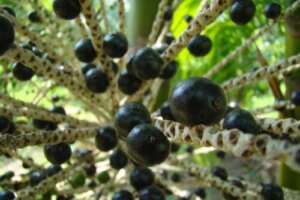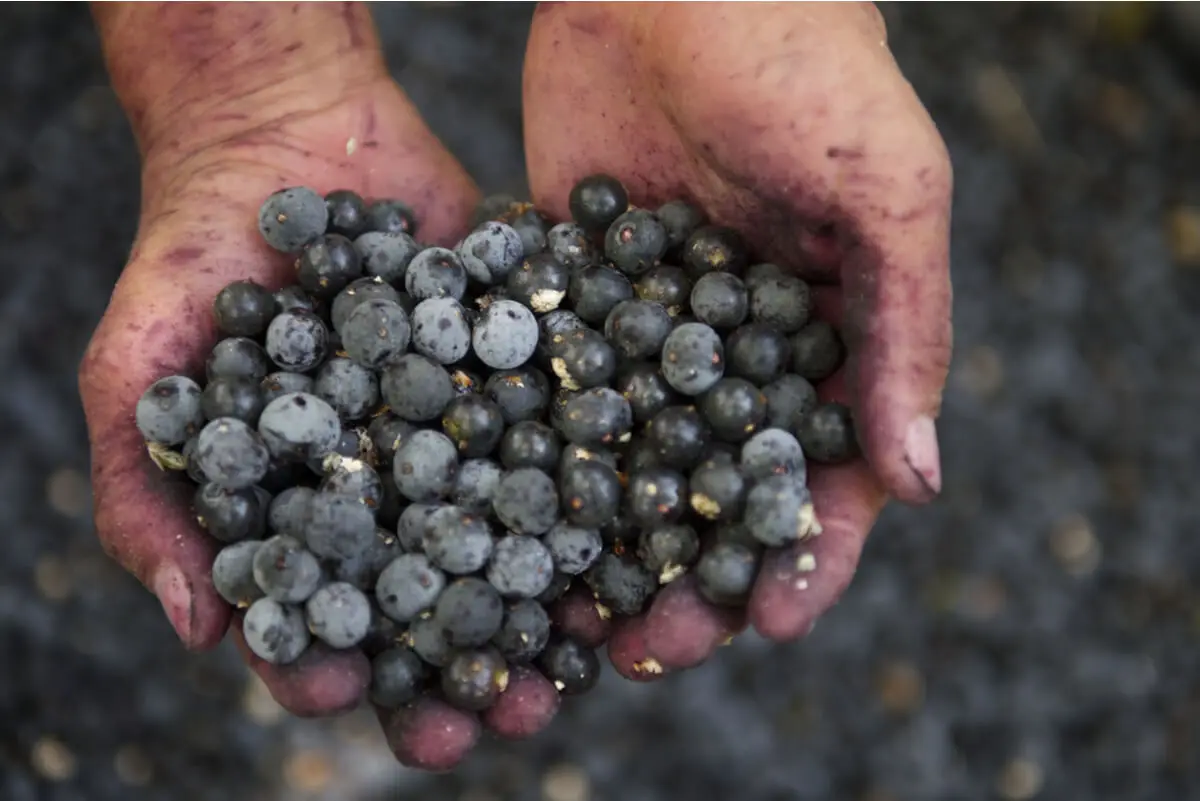Acai Berries: Benefits and Contraindications


Reviewed and approved by the doctor Leonardo Biolatto
Acai berries come from the Euterpe oleracea palm tree, cultivated in South America, specifically in the countries of the Amazon region, where they are a staple food. Their appearance is similar to that of a grape, with a bluish-purple color, but with a yellow pulp covering a large seed.
They are about 2.5 centimeters (1 inch) in size and have an earthy flavor that has been described as a combination of the taste of blackberries and bitter chocolate. Since it’s a perishable food, the pulp is often exported frozen, as a dried powder, or as a juice. Interested in learning more about its nutritional properties and benefits? Read on!
Nutritional properties of acai berries
Much of the health benefits of acai berries are attributed to their nutritional properties. In particular, and according to data compiled by the United States Department of Agriculture (USDA), 100 grams (4 oz) of the berries provide the following:
- Calories: 70
- Fat: 5 grams
- Saturated fat: 1.5 grams
- Carbohydrates: 4 grams
- Sugar: 2 grams
- Fiber: 2 grams
- Vitamin A: 15% of the daily recommended values
- Calcium: 2% of the recommended daily values
Meanwhile, information reported in Archivos Latinoamericanos de Nutrición suggests that acai also contains other trace minerals such as chromium, zinc, iron, copper, magnesium, potassium and phosphorus.
In addition to this, it’s a significant source of anti-ocyanins, which aren’t only responsible for its characteristic color, but also for its antioxidant properties.

Read also: How to Grow Blackberries and What Are Their Benefits?
Benefits of acai berries
Until a few years ago, acai berries were known as a “superfood”, due to their nutritional composition. Because they provide more antioxidants than other fruits, such as blueberries and strawberries, it was even claimed that they were curative. However, nutritionists and health experts made some clarifications in this regard.
While it’s true that they’re a nutritious food, there isn’t enough evidence to claim that they can cure diseases. Adding them to the diet helps to improve nutritional quality, but they don’t replace medical treatments or the effects of maintaining a healthy and varied diet.
In other words, acai can have a very positive effect on health, as long as it’s included in the framework of a balanced diet. And what are its main effects? Read on.
They help fight oxidative stress
One of the main properties of acai berries is their antioxidant activity. While blueberries have an oxygen radical absorbance capacity (ORAC) score of 4669, 100 grams (4 oz) of frozen acai pulp have an ORAC of 15,405.
These effects are attributed to their concentration of anthocyanins which, once assimilated, help counteract the effects of oxidative stress. In the medium and long term this translates into a decreased risk of chronic diseases, such as cardiovascular, metabolic, and cancer.
They help regulate cholesterol
Including these fruits in the regular diet can help reduce the risk of cardiovascular disease. Animal studies, such as one published in Nutrition Research, found that acai supplementation stabilizes cholesterol levels by reducing total and LDL or bad cholesterol.
Meanwhile, research in Nutrition Journal found that overweight adults who consumed acai smoothies twice a day for a month had better control of their lipid profile at the end of the study. Still, further testing is suggested to corroborate these effects.
Helps boost brain function
Bioactive compounds in this food, especially its antioxidants, help protect the brain from the negative effects of aging. Research in the Journal of Agricultural and Food Chemistry details that acai berries mitigate damage from inflammation and oxidation of brain cells.
Because of this, they are said to be ideal for protecting memory and improving learning processes. Anecdotal evidence also indicates that its juice and derivatives act as a natural energizer, which improves alertness.
Other possible benefits
In natural medicine, acai berries are used against various ailments and diseases. It isn’t a first-line treatment, but it appears to be an adjuvant in reducing some symptoms.
According to a publication by the US corporation WebMD, there’s insufficient evidence for the following:
- Improved athletic performance
- Control of blood glucose levels
- Decreased risk of metabolic syndrome
- Prevention of skin aging
- Control of erectile dysfunction
- Relief of osteoarthritis
You may be interested in: How to Grow Blueberries at Home
Contraindications of acai berries
The Mayo Clinic suggests that acai berries are safe for most healthy adults. Even so, it recommends avoiding their consumption in case of pregnancy or breastfeeding, since it isn’t known what their effects are in these stages. On the other hand, there are no known side effects of consuming the fruit.
Some reports relate the intake of raw acai juice with outbreaks of the disease known as “American trypanosomiasis” or “Chagas disease”, but there’s no conclusive evidence.

How to consume acai berries?
Acai berries and derived supplements are usually found in health food stores. The best way to consume them is fresh, but they have a short shelf life. Therefore, they’re usually found in the following formats:
- Frozen pulp
- Tablets
- Powder
- Food products (such as smoothies, jellies or energy drinks)
The frozen pulp can be used to prepare homemade smoothies, for example, with milk or oatmeal. The powder, on the other hand, can be added to salads, ready-made smoothies, desserts, and many other recipes.
What should you remember about acai berries?
Despite the ideas promoted by marketing about acai berries, this fruit isn’t curative nor does it have super properties. Still, it’s valued for its nutritional composition, which undoubtedly improves the quality of the diet.
Its regular consumption is related to disease prevention and better mental concentration. It’s safe for most people, but moderate intake is recommended.
All cited sources were thoroughly reviewed by our team to ensure their quality, reliability, currency, and validity. The bibliography of this article was considered reliable and of academic or scientific accuracy.
- Marcason W. What is the açaí berry and are there health benefits? J Am Diet Assoc. 2009 Nov;109(11):1968. doi: 10.1016/j.jada.2009.09.017. PMID: 19857637.
-
Neida S, Elba S. Caracterización del acai o manaca (Euterpe olerdcea Mart.): un fruto del Amazonas [Characterization of the acai or manaca (Euterpe oleracea Mart.): a fruit of the Amazon]. Arch Latinoam Nutr. 2007 Mar;57(1):94-8. Spanish. PMID: 17824205.
- Mertens-Talcott SU, Rios J, Jilma-Stohlawetz P, Pacheco-Palencia LA, Meibohm B, Talcott ST, Derendorf H. Pharmacokinetics of anthocyanins and antioxidant effects after the consumption of anthocyanin-rich acai juice and pulp (Euterpe oleracea Mart.) in human healthy volunteers. J Agric Food Chem. 2008 Sep 10;56(17):7796-802. doi: 10.1021/jf8007037. Epub 2008 Aug 12. PMID: 18693743.
- de Souza MO, Souza E Silva L, de Brito Magalhães CL, de Figueiredo BB, Costa DC, Silva ME, Pedrosa ML. The hypocholesterolemic activity of açaí (Euterpe oleracea Mart.) is mediated by the enhanced expression of the ATP-binding cassette, subfamily G transporters 5 and 8 and low-density lipoprotein receptor genes in the rat. Nutr Res. 2012 Dec;32(12):976-84. doi: 10.1016/j.nutres.2012.10.001. Epub 2012 Nov 1. PMID: 23244543.
- Udani JK, Singh BB, Singh VJ, Barrett ML. Effects of Açai (Euterpe oleracea Mart.) berry preparation on metabolic parameters in a healthy overweight population: a pilot study. Nutr J. 2011 May 12;10:45. doi: 10.1186/1475-2891-10-45. PMID: 21569436; PMCID: PMC3118329.
- Poulose SM, Fisher DR, Larson J, Bielinski DF, Rimando AM, Carey AN, Schauss AG, Shukitt-Hale B. Anthocyanin-rich açai (Euterpe oleracea Mart.) fruit pulp fractions attenuate inflammatory stress signaling in mouse brain BV-2 microglial cells. J Agric Food Chem. 2012 Feb 1;60(4):1084-93. doi: 10.1021/jf203989k. Epub 2012 Jan 20. PMID: 22224493.
- Nóbrega AA, Garcia MH, Tatto E, et al. Oral transmission of Chagas disease by consumption of açaí palm fruit, Brazil. Emerg Infect Dis. 2009;15(4):653-655. doi:10.3201/eid1504.081450
This text is provided for informational purposes only and does not replace consultation with a professional. If in doubt, consult your specialist.








